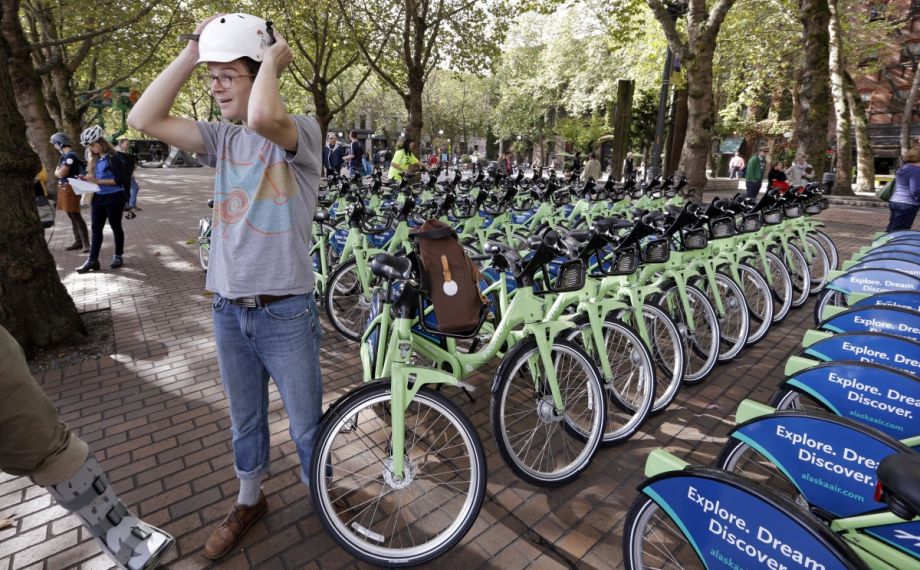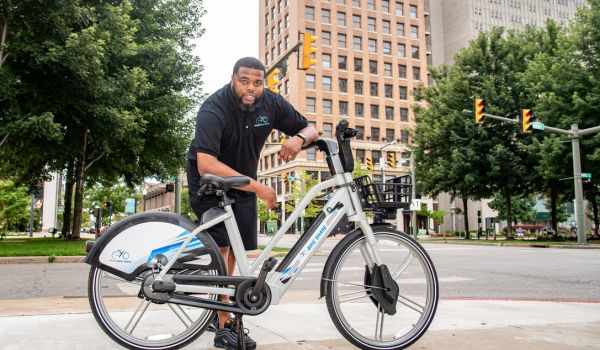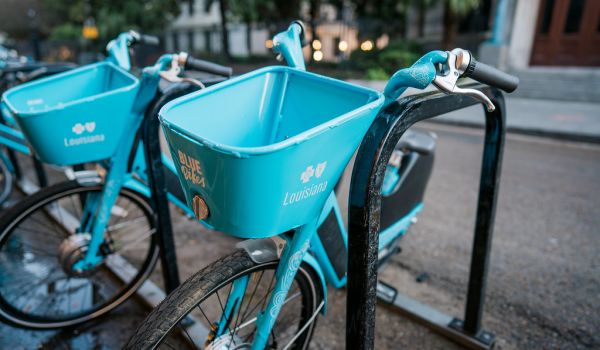After a little over two years of operation, a $1.7 million infusion of city money to stave off insolvency, and plenty of debate over the value of bike-sharing in Seattle, Pronto’s bumpy ride is coming to an end on March 31, 2017. And though the Seattle Department of Transportation is currently negotiating a contract with Montreal-based bike-share vendor Bewegen to provide equipment for a new, all-electric-assist system, bike-sharing’s future in the city is far from guaranteed.
Seattle City Council Tuesday approved amendments to Mayor Ed Murray’s 2017-2018 budget, including two related to bike-share funding. One, from Council Member Lisa Herbold, reduces Pronto’s operations funding to $300,000 — enough to run the system through the end of the first quarter of 2017. The second, from Council Member Tim Burgess, gives the City Council strict control of bike-share funding that might be spent on launching a new system. Both Herbold and Burgess voted against a $1.4 million Pronto bail-out in March.
When she introduced her amendment last month, Herbold initially sought to cut all of Pronto’s 2017 and 2018 funding, which would’ve shut the system down at the end of this year. The funding would’ve instead been redirected to projects in the city’s bicycle and pedestrian master plans. SDOT requested funding for Pronto through March to avoid impacting their negotiations with Bewegen or their search for sponsors for the new system.
SDOT Transit Director Andrew Glass Hastings says he is happy to get another quarter of funding.
“I wanted to make sure we weren’t forced to shut down Pronto prematurely, before we can communicate the future of bike-share,” he explains. “Whether that’s council giving it the green light or deciding not to proceed, we want to communicate it clearly one way or another. I thought we owed it to our customers and the public at large to have a clear path forward.”
Even with the extended operations funding, there will be a gap between Pronto’s shutdown and the replacement launch. SDOT says it’s aiming for a July or August 2017 launch. But, if the launch date gets pushed back too far, the city plans to hold off opening until Spring 2018 rather than starting during Seattle’s rainy fall and winter.
“I’m not concerned about the gap,” says Glass Hastings. “It could actually provide us the opportunity to reframe the conversation around the future of bike-share and the expanded system.”
Burgess’ amendment creates a proviso stipulating that, “None of the money appropriated in the 2017 budget may be spent on the expansion of a bike share system until authorized by Council through a future ordinance. Furthermore, none of the money appropriated in the 2017 budget may be spent on the operation of a bike share system after March 31, 2017 unless authorized by Council through a future ordinance.”
SDOT already needed council’s approval in order to move forward on the new bike-share system, but Burgess explains, “We’re being a little firmer this year … because our experience with Pronto has been very negative. Membership and ridership continues to decline. The city is losing money. I also did not appreciate the shenanigans SDOT went through last year and earlier this year related to Pronto.”
Among those shenanigans, Burgess says, was the agency contravening a November 2015 council proviso prohibiting bike-share spending when they quietly spent $305,000 to keep Pronto afloat before asking for the $1.4 million intervention.
Burgess’ budget amendment makes it clear the city council could shut down the proposed Bewegen system if it’s unhappy with the terms. In its bid to the city, Bewegen proposed installing 100 stations with 1,200 electric-assist bikes (up from Pronto’s 50 stations and 500 bikes). Dubbed “pedalecs” in the industry, the bikes have a small motor that kicks in when the rider is pedaling (as opposed to a motor that turns the wheel on its own). It essentially makes pedaling up a hill feel as easy as pedaling on flat ground, a feature that the city hopes will attract riders in hilly Seattle and draw a broader range of users.
But topography is only one of the problems Pronto faced. In a policy paper on bike-share, Cascade Bicycle Club pointed to several factors including: small system size with questionable station placement, insufficient station density, a pricing structure that “was prohibitive for low-income and casual users,” and the lack of a protected bike infrastructure network in the downtown core.
Still, Cascade remained supportive of Pronto and advocated strongly for saving the system last March. They also support the launch of a replacement system. In their policy paper they outline their hopes for the new system including: “A commitment to station density; increased community and stakeholder engagement around station placement; completing a downtown network of protected bike lanes.” The paper also says, “Improved integration with the ORCA payment system, and more accessible pricing options, will also broaden the appeal.”
Glass Hastings’ says SDOT has learned lessons from their experience with Pronto.
“[The Bewegen proposal] allows us to double system size at launch. We know bike-share just wasn’t big enough. It didn’t have the density. We know from other bike-share systems around the country the size and density matters.”
He also points to the integration of the ORCA transit smart card in the new system as a lesson learned about how to make bike-share part of the public transit network. Users would be able to unlock bikes from the docks using the card. Eventually SDOT hopes to integrate bike-share into the transit network allowing transfers from bus or light rail to bike-share.
That is, if council approves the plan. Burgess says one of his biggest concerns is investing nearly $5 million in bike-share bikes and charging and docking stations.
He explains, “One red flag to me is all three of the finalist vendors said that they would be happy to cover the cost of operations and the ongoing maintenance of the bike-share system and share revenues, but the city would have to purchase all of the new equipment. … The technology around electric bikes is changing so very rapidly. I don’t want to be in the position where we spend $5 million just to find out 12, 18, 24 months later these bikes are obsolete.”
Glass Hastings says the pedal-assist bikes are ahead of the curve. “It’s clear that the bike-share industry is moving in this direction … We are as much as possible future-proofing the system by adopting the technology now.”
SDOT will present its plan and the Bewegen contract to Council in January.

Josh Cohen is Crosscut’s city reporter covering Seattle government, politics and the issues that shape life in the city.
Follow Josh .(JavaScript must be enabled to view this email address)
















